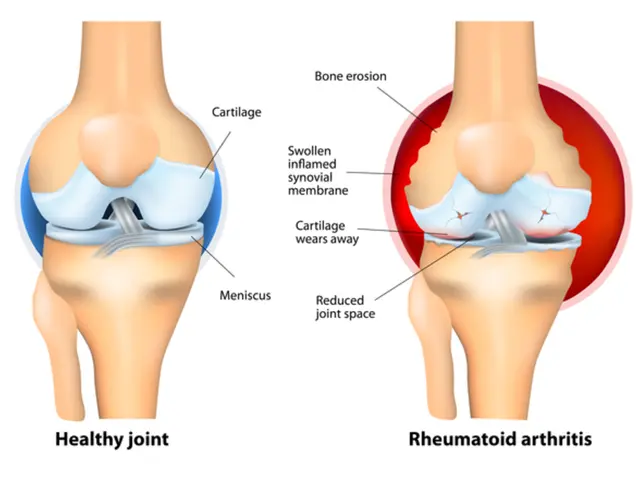Potential Bedroom Troubles Indicating Cardiovascular Issues
Getting to the Core of Erectile Dysfunction: A Guide
Let's dive straight into it: Struggling to maintain an erection can be a challenging, even uncomfortable topic. Yet, it's crucial to discuss this issue with your doctor. Troubles in the bedroom can often be an early sign of more significant health problems lurking around the corner.
Unraveling the Complexity of Erections
An erection, put simply, is a rush of blood to the penis. Signals from the brain and spinal cord travel along nerves and trigger the two tube-like structures in the penis to fill with blood, making the shaft firm. Dr. Marah Hehemann, a urologist at the Men's Health Center at UW Medical Center - Roosevelt, and assistant professor at UW School of Medicine, explains, "We might think of erections as something that just happen, but in reality, it's a complex system."
When Things Go Wrong: Understanding Erectile Dysfunction (ED)
It's no surprise that different parts of this intricate system can malfunction, resulting in ED. This issue impacts men of all ages, with studies suggesting that 20 percent of men under 40 experience some form of ED, and that percentage rises with age.
Hehemann breaks down the five essential components of your body that need to work harmoniously for an erection:
- Your vascular system, which carries blood throughout the body. Factors such as diabetes, high cholesterol, and smoking can harm blood vessels.
- Your nerves, which transmit signals from the brain to the penis, can be affected by trauma or prostate cancer surgery.
- Your testosterone, a vital hormone, can be deficient.
- Your penile tissue, which fills with blood during an erection, can scar, preventing it from properly dilating.
- Your autonomic nervous system, which controls automatic processes and erections, is made up of the "fight or flight" sympathetic portion and the "rest and digest" parasympathetic portion. If you're anxious or stressed, the sympathetic system can overpower the parasympathetic system, leading to ED.
A variety of treatments exist today, from oral medications like sildenafil (Viagra) and tadalafil (Cialis) to devices like vacuum pumps, injections, gels, and even implants.
The Underlying Culprit: Vascular Disease
One of the most common causes of ED is vascular disease, which is responsible for the majority of cases. In fact, ED may precede heart disease as the penile arteries, only 1 millimeter in diameter, can become affected before larger arteries, such as those in the heart or neck.
Saving More Than Just Your Sex Life
As ED may signal the presence of vascular disease, discussing this issue with your doctor could potentially save your life. Dr. John Amory, a physician at the General Internal Medicine Center at UW Medical Center - Roosevelt and professor at UW School of Medicine, emphasizes, "Blood vessels in the penis are our early warning system."
Motivating Better Health
If there's a silver lining to ED, it's that it can inspire men to prioritize their health. For Amory, "Viagra has saved a lot of men's lives." While Viagra itself won't save you, learning from your doctor about underlying health risks and making lifestyle changes could be life-changing.
After all, adopting a healthy lifestyle, including exercise and a plant-based diet, is one of the most effective ways to manage vascular disease. In fact, Dr. Hehemann, author of a review paper in 2016, has shown how such lifestyle changes can improve erectile quality and delay or prevent dysfunction by enhancing cardiovascular health.
So, if you've been neglecting your health, the opportunity to improve your sex life might just be the motivation you need to make a change. As Hehemann says, "I'm happy to be their cheerleader."
Overall:
ED is a multifaceted issue with both physical and psychological factors. Understanding these factors can aid in addressing not only ED but also the underlying health problems contributing to it.
Common Causes of Erectile Dysfunction
Physical Causes:
- Vascular conditions, such as heart disease, high blood pressure, and atherosclerosis.
- Metabolic disorders, including obesity, diabetes, and metabolic syndrome.
- Neurological conditions, like Parkinson's disease and multiple sclerosis.
- Hormonal imbalances, particularly low testosterone levels.
- Medications, such as blood pressure drugs and antidepressants.
- Surgical procedures or injuries affecting the pelvic area.
Psychological Causes:
- Stress and anxiety.
- Depression.
- The complexity of erections is a health topic worth discussing, as they might indicate underlying medical conditions like vascular disease, which can be an early warning sign for heart disease.
- Despite ED being a complex issue with multiple physical and psychological factors, adopting a healthy lifestyle that includes exercise, a plant-based diet, and managing mental health can significantly improve erectile quality and delay or prevent dysfunction by enhancing cardiovascular health.
- In addition to addressing ED, understanding the factors contributing to it can shed light on broader health issues such as metabolic disorders, neurological conditions, hormonal imbalances, and psychological issues like stress and depression.
- Men's health centers, like the Men's Health Center at UW Medical Center - Roosevelt, play a crucial role in providing comprehensive care for ED, offering various treatment options ranging from oral medications to devices, injections, gels, and even implants.





